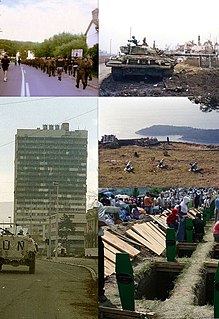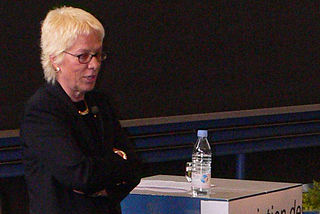| UN Security Council Resolution 1900 | |
|---|---|
Coat of arms of the Socialist Federal Republic of Yugoslavia | |
| Date | 16 December 2009 |
| Meeting no. | 6,242 |
| Code | S/RES/1900 (Document) |
| Subject | International Tribunal for the former Yugoslavia |
Voting summary | 15 voted for None voted against None abstained |
| Result | Adopted |
| Security Council composition | |
Permanent members | |
Non-permanent members | |
United Nations Security Council Resolution 1900, adopted unanimously on December 16, 2009, after recalling resolutions 827 (1993), 1581 (2005), 1597 (2005), 1613 (2005), 1629 (2005), 1660 (2006), 1668 (2006), 1800 (2008), 1837 (2008), 1849 (2008) and 1877 (2009), the Council permitted several judges at the International Criminal Tribunal for the former Yugoslavia to serve beyond the expiry of their term of office to enable them to complete work on cases in which they were involved.

The United Nations (UN) is an intergovernmental organization that was tasked to maintain international peace and security, develop friendly relations among nations, achieve international co-operation and be a centre for harmonizing the actions of nations. The headquarters of the UN is in Manhattan, New York City, and is subject to extraterritoriality. Further main offices are situated in Geneva, Nairobi, and Vienna. The organization is financed by assessed and voluntary contributions from its member states. Its objectives include maintaining international peace and security, protecting human rights, delivering humanitarian aid, promoting sustainable development and upholding international law. The UN is the largest, most familiar, most internationally represented and most powerful intergovernmental organization in the world. In 24 October 1945, at the end of World War II, the organization was established with the aim of preventing future wars. At its founding, the UN had 51 member states; there are now 193. The UN is the successor of the ineffective League of Nations.

United Nations Security Council resolution 827, adopted unanimously on 25 May 1993, after reaffirming Resolution 713 (1991) and all subsequent resolutions on the topic of the former Yugoslavia, approved report S/25704 of Secretary-General Boutros Boutros-Ghali, with the Statute of the International Tribunal as an annex, establishing the International Criminal Tribunal for the former Yugoslavia (ICTY).

United Nations Security Council resolution 1581, adopted unanimously on 18 January 2005, after recalling resolutions 1503 (2003) and 1534 (2004), the Council approved the extension of the terms of office of seven short-term judges at the International Criminal Tribunal for the former Yugoslavia (ICTY) in order to allow them to finish adjudicating the cases on which they had been working. It was the first Security Council resolution adopted in 2005.
Acting under Chapter VII of the United Nations Charter, the Council decided that judges Kimberley Prost (Canada) and Ole Bjørn Støle (Norway) whose terms were to expire on December 31, 2009, could complete the Popović case which was scheduled to end by March 2010. At the same time, it was noted that the total number of ad litem judges serving on the Tribunal might temporarily exceed the maximum of 12 provided for to a maximum of 13. The number of judges would return to 12 by the end of March 2010.
Chapter VII of the United Nations Charter sets out the UN Security Council's powers to maintain peace. It allows the Council to "determine the existence of any threat to the peace, breach of the peace, or act of aggression" and to take military and nonmilitary action to "restore international peace and security".

Canada is a country in the northern part of North America. Its ten provinces and three territories extend from the Atlantic to the Pacific and northward into the Arctic Ocean, covering 9.98 million square kilometres, making it the world's second-largest country by total area. Canada's southern border with the United States is the world's longest bi-national land border. Its capital is Ottawa, and its three largest metropolitan areas are Toronto, Montreal, and Vancouver. As a whole, Canada is sparsely populated, the majority of its land area being dominated by forest and tundra. Consequently, its population is highly urbanized, with over 80 percent of its inhabitants concentrated in large and medium-sized cities, many near the southern border. Canada's climate varies widely across its vast area, ranging from arctic weather in the north, to hot summers in the southern regions, with four distinct seasons.
Ole Bjørn Støle was a Norwegian judge.
The International Criminal Tribunal for the Former Yugoslavia, established in Resolution 827 (1993), was a United Nations court of law dealing with war crimes that took place during the conflicts of the early 1990s that followed the break-up of the Socialist Federal Republic of Yugoslavia.

The Yugoslav Wars were a series of separate but related ethnic conflicts, wars of independence and insurgencies fought in the former Yugoslavia from 1991 to 2001, which led to the breakup of the Yugoslav state. Its constituent republics declared independence, despite unresolved tensions between ethnic minorities in the new countries, fueling the wars.

The Socialist Federal Republic of Yugoslavia was a country located in central and Southeastern Europe that existed from its foundation in the aftermath of World War II until its dissolution in 1992 amid the Yugoslav Wars. Covering an area of 255,804 km², the SFRY was bordered by the Adriatic Sea and Italy to the west, Austria and Hungary to the north, Bulgaria and Romania to the east, and Albania and Greece to the south.













